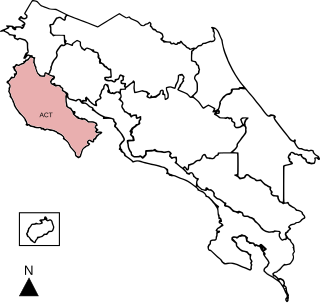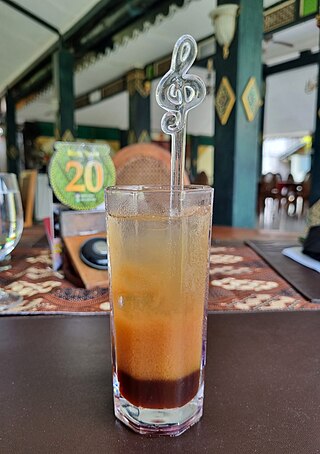See also
- Tamarind (disambiguation), other tropical trees
- Tamarin, a kind of monkey
Tamarindo is the Spanish word for a tamarind.
Tamarindo can also refer to:

Tamarind is a leguminous tree bearing edible fruit that is indigenous to tropical Africa and naturalized in Asia. The genus Tamarindus is monotypic, meaning that it contains only this species. It belongs to the family Fabaceae.

Guanacaste is a province of Costa Rica located in the northwestern region of the country, along the coast of the Pacific Ocean. It is bordered by Nicaragua to the north, Alajuela Province to the east, and Puntarenas Province to the southeast. It is the most sparsely populated of all the provinces of Costa Rica. The province covers an area of 10,141 square kilometres (3,915 sq mi) and as of 2010, had a population of 354,154, with annual revenue of $2 billion.
National System of Conservation Areas is part of the Ministry of Environment and Energy (MINAE) of Costa Rica. It is the administrator for the nation's national parks, conservation areas, and other protected natural areas.

Nicaraguan cuisine includes a mixture of Mesoamerican, Chibcha, Spanish, Caribbean, and African cuisine. Despite the blending and incorporation of pre-Columbian, Spanish and African influences, traditional cuisine differs from the western half of Nicaragua to the eastern half. Western Nicaraguan cuisine revolves around the Mesoamerican diet of the Chorotega and Nicarao people such as maize, tomatoes, avocados, turkey, squash, beans, chili, and chocolate, in addition to potatoes which were cultivated by the Chibcha people originating from South America and introduced meats like pork and chicken. Eastern Nicaraguan cuisine consists mostly of seafood and coconut.
TNO may refer to:

Tamarindo, also commonly known as agua de tamarindo, is a non-alcoholic beverage made of tamarind, sugar, and water. The tamarind plant originated in Africa but has since been widely distributed on a global scale and is commonly found in tropical regions. The tamarind plant produces fruit pods containing pulp and seeds. Tamarind is a versatile ingredient that is used for a variety of commercial, culinary and medicinal purposes with the pulp being the most commonly used part of the tamarind plant, used in a range of beverages including tamarindo and other similar beverages such as Nam Ma Kham Wan in Thailand and Poha Beer in Ghana. Tamarind pulp offers a flavour that ranges from sour to sweet, making tamarindo a sour-sweet beverage recognised as a popular flavour of aguas frescas, which is traditionally consumed in Latin America. Comprising only three ingredients, tamarindo involves a simple production process making it an easy beverage to prepare at home. Tamarindo has been produced commercially as a soda flavour, by companies such as Jarritos and Nestle, and distributed globally.

Tempisque Conservation Area is an administrative area which is managed by SINAC for the purposes of conservation in the western part of Costa Rica, including the Tempisque River valley and the Nicoya Peninsula. It contains a number of National Parks, Wildlife refuges and Forest Reserves.

Las Baulas de Guanacaste Marine National Park is a National Park of Costa Rica and a Ramsar Site. The park is managed by the Tempisque Conservation Area, and covers approximately a 167.3 square kilometres (64.6 sq mi) marine area of the Tamarindo Bay, next to the town of Tamarindo. It supports the largest nesting colony of leatherback sea turtles on the Pacific coast of the Americas. Female leatherbacks often come ashore at Playa Grande between October and May to lay their eggs.
Iguanita Wildlife Refuge is a wildlife refuge in the Guanacaste Conservation Area located in the Guanacaste Province of northwestern Costa Rica.
Parque del Carmen is a park in Santa Clara, Cuba, which honors the city's founding. It is located in the ward (reparto) El Carmen, not too far from Martyr's Park and the railway station.

Playa Grande, also known as Salinas, is a beach community on the Pacific coast of Costa Rica just north of Tamarindo. It is located inside the canton of Santa Cruz in Guanacaste Province. Playa Grande has been part of the Parque Nacional Marino Las Baulas since 1990. There are palm trees and vegetation around the beach, which stretches for about 4.5 kilometers. It is part of the Las Baulas National Marine Park, which was established to protect the nesting grounds of endangered leatherback turtles. Playa Grande is one of the major nesting sites for these turtles, and visitors can witness the nesting and hatching process during the nesting season, which typically occurs from October to March. The main attraction of Playa Grande is its surf breaks. The beach has consistent waves. Playa Grande is an ideal destination for nature lovers, with diverse ecosystems surrounding it. Beyond the beach, you can explore the nearby mangrove forests, take boat tours along the estuaries, or venture into the neighboring national parks, such as Rincon de la Vieja or Santa Rosa, which offer hiking trails, wildlife spotting opportunities, and breathtaking landscapes.

Jarritos is a brand of soft drink in Mexico, owned by Novamex, a large independent bottling conglomerate based in El Paso, Texas. Jarritos was founded in 1950 by Don Francisco "El Güero" Hill.
Playa Grande may refer to:
The Leatherback Trust is a non-profit organization dedicated to the conservation and study of sea turtles and freshwater turtles, with special regard for the leatherback sea turtle. The Leatherback Trust was founded in 2000 to help consolidate Las Baulas National Marine Park, one of the last major nesting site for the critically endangered leatherback turtle in the Eastern Pacific Ocean. The park protects Playa Grande, Playa Ventanas, Playa Langosta, the ocean out to 12 nautical miles, wetlands, highlands, and the coast inland to 125 m from the high tide line.

The Central American dry forests ecoregion, of the tropical and subtropical dry broadleaf forests biome, is located in Central America.
Tamarind is a species of tree and the fruit from that tree.
Okenia academica is a species of sea slug, specifically a dorid nudibranch, a marine gastropod mollusc in the family Goniodorididae.

Tamarind Juice is a 2019 Peruvian comedy film written, directed, produced and co-starred by Julio Andrade in his directorial debut. Starring Karen Dejo, Leslie Stewart and Gerardo Zamora. It is based on the homonymous video clip by Julio Andrade.

Tamarind juice is a liquid extract of the tamarind tree fruit, produced by squeezing, mixing and sometimes boiling tamarind fruit pulp. Tamarind juice can be consumed as beverage appreciated for its fresh sour taste, or used for culinary purpose as a sour flavouring agent. The recent development uses tamarind juice as a mixture in cocktail.